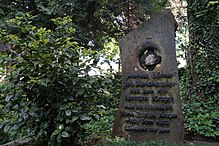Therese Körner
Maria-Theresia Körner (born Dierichsweiler ; born November 21, 1901 in Lengsdorf ; † April 16, 1994 in Bonn ) was a German CDU local politician .
Life
Therese Körner was born as the third child of the master baker Hubert Dierichsweiler and his wife Therese. Thanks to her father, she was able to study and in November 1918 began studying at the Heyermann Schools, a private seminar for teachers in Bonn. In March 1922, she completed her studies with a teacher’s exam, but did not get a job in the school service. In the same year she accepted a job as a secretary at the Cartel Association of Christian Unions in Bonn. It was here that she met her future husband Heinrich Körner . In 1923 she found work for a few months at the Städtische Sparkasse. The couple married in 1924.
1933-1945
After taking power in 1933, the husband was briefly arrested in connection with the break-up of the trade unions. In the Bonn area, the Körner couple were the focus of opposition activists from the Düsseldorf , Cologne and Bonn areas. There was very close contact with the Kaiser family . Therese Körner volunteered as an air raid guard in order to keep an eye on the neighborhood and was able to support a Jewish neighbor inconspicuously until she was deported . After the failed assassination attempt on Hitler, she destroyed all incriminating documents as a precaution. The Nazis searched for the arrest of the man on several occasions the family home. After learning that her husband had been murdered, she decided to carry on her husband's political legacy.
Political career

In the early summer of 1945 she invited a group of people from the resistance , former center members , trade unions and social democrats to her house. There the founding of the Bonn CDU was prepared significantly. In August 1945 she started as a junior teacher at the Nikolausschule in Kessenich and, after her second state examination, helped set up the Elisabethschule. She stayed here until early retirement in 1959. On September 21, 1945, she and 37 other people helped found the CDU in Bonn. The British military government appointed her to the Bonn City Council in 1946, and she remained there as a city councilor until 1964 . She was also appointed by the military government to the main denazification committee of teaching staff at Bonn schools. She helped the first manager of the relief organization on July 20, 1944 , Renate Countess Hardenberg, to support bereaved relatives and survivors of the resistance. She was active as a member of several Bonn committees, in the housing, culture, school, youth welfare and finance committee.
Körner lived in Beuel from 1968 until her death . Her grave is in the Kessenicher Bergfriedhof .
family
The Körner couple had three daughters. Journalist Gemma Pörzgen is a granddaughter .
literature
- Günter letter , Brigitte Kaff , Hans-Otto Kleinmann : Christian democrats against Hitler. Published on behalf of the Konrad Adenauer Foundation . Herder , Freiburg im Breisgau 2004, ISBN 3-451-20805-9 , pp. 330–336.
- Susanne Wilking, Anne Vechtel: From city mothers, councilors and emanciers. Female city councilors in Bonn from 1945 to 1969. Stadtarrhiv Bonn, 2001, ISBN 3-922832-30-X .
- Dieter Partzsch: You once lived in Kessenich. Life and work of well-known Kessenich citizens, including the personalities after whom streets in Kessenich are named . Bonn 1997, pp. 128-130.
Web links
- Biography of Körner by Vera Bücker (with references)
- ( Page no longer available , search in web archives: Martyrs of the Archdiocese of Cologne )
- Hans-Peter Brenner: Resistance in the Province 1933-1945 ( Memento from August 16, 2007 in the Internet Archive )
Individual evidence
- ↑ Partzsch 1997, p. 132
- ↑ Gemma Pörzgen about her grandparents
- ↑ nwbib.de
| personal data | |
|---|---|
| SURNAME | Körner, Therese |
| ALTERNATIVE NAMES | Dierichsweiler, Maria-Theresia (birth name); Körner, Maria-Theresia |
| BRIEF DESCRIPTION | German local politician (CDU) |
| DATE OF BIRTH | November 21, 1901 |
| PLACE OF BIRTH | Lengsdorf |
| DATE OF DEATH | April 16, 1994 |
| Place of death | Bonn |